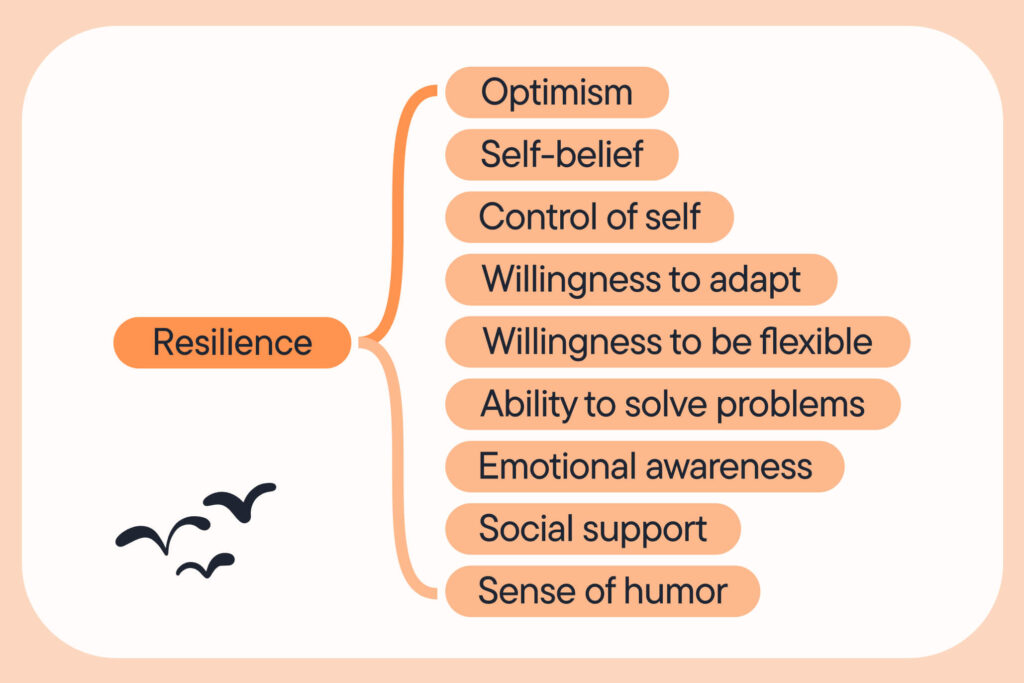
Compare Providers
Download our outplacement comparison sheet
Request Pricing
Compare our rates to other providers
Careers today are anything but predictable. Gone are the days of staying at one company for decades or climbing a single, linear ladder. Whether due to shifting industries, evolving personal values, or layoffs and global crises, change is now a constant in the world of work.
The question is no longer if you’ll face change—but how you’ll respond to it. That’s where career resilience comes in.
In this article, we’ll explore what career resilience really means and why it’s more important than ever in today’s job market, as well as tips on how to develop career resilience and real-world examples at different career stages—from entry-level to executive.
Whether you’re navigating uncertainty or simply want to future-proof your career, understanding career resilience is the first step toward long-term success and satisfaction.
What Is Career Resilience?
More and more employers are asking employees to be responsible for their own career development. In the past, decisions to acquire new skills or change career focus were often in response to the requirements of an employer. Today, the individual is expected to be a full partner in their own professional development and proactively stay up to date with changes in their chosen field.
In psychology, “resilience” is the positive capacity of people to cope with stress and adversity. It is the ability to adapt well to new situations and setbacks. It encompasses both strength and flexibility, and is emerging as a necessary ability in the workplace.
So then what is career resilience? Career resilience is defined as the ability to adjust to career change as it happens and, by extension, adapt to what the market demands. The possibility of an unexpected job loss should not be the primary motivator for individuals to take stock of their careers.
Why Is Career Resilience Important?
Here are a few key reasons why career resilience matters:
1. The Job Market Is Unpredictable
From economic downturns to organizational restructuring, external changes are often outside your control. Career resilience equips you with the mindset and tools to respond instead of react, so that you can adapt quickly, reframe challenges, and continue moving forward no matter what the job market throws your way.
2. Setbacks Are Inevitable
Everyone experiences professional disappointment, whether it’s rejection, burnout, missed promotions, or difficult colleagues. What sets resilient professionals apart is their ability to stay grounded, learn from adversity, and use those moments as stepping stones toward future growth.
3. Growth Requires Discomfort
Progress in your career often means stepping into the unknown, learning new skills, and stretching beyond your comfort zone. Resilience fuels that process, helping you manage fear, remain flexible, and stay focused on long-term goals even when the path is unclear.
4. Resilient Employees Are Invaluable to Organizations
Companies value professionals who can stay calm under pressure, recover from setbacks, and support team morale during times of change. Career resilience enhances not only individual performance, but also team and organizational stability. This makes resilient individuals natural leaders and culture carriers.
5. Improvement of Mental and Emotional Well-Being
Professional resilience protects against burnout, stress, and career-related anxiety. It empowers professionals to set boundaries, advocate for themselves, and prioritize alignment over achievement—leading to greater satisfaction, confidence, and well-being over time.
If you’re ready to develop greater career resilience in yourself and your organization’s employees, click below to speak with our experts and learn more about our Careerminds leadership coaching and career development services.

How Can I Build Resilience in My Career?
Resilient people are able to organize and manage ambiguity, be proactive, and maintain an optimistic mindset that is open to learning. Developing career resilience means taking charge of one’s own career and the ongoing development of characteristics identified for employability
Here are 10 tips for building career resilience:
1. Demonstrate a commitment to personal excellence.
2. Accept change as an opportunity for growth and challenge.
3. Maintain a positive outlook even in times of uncertainty.
4. Take charge of your development.
5. Become a lifelong learner.
6. Find your sense of purpose by visualizing your future and defining your goals.
7. Think creatively and flexibly, focusing on the future.
8. Cultivate personal and professional relationships.
9. Reflect on yourself and your career often.
10. Practice self-care by exercising, eating healthy, and spending time with supportive friends.
What Are Examples of Career Resilience?
Career resilience is a skill that looks different at each stage of a person’s professional journey. Below are real-world examples of career resilience across entry-level, mid-level, and executive-level roles.
Entry-Level Career Resilience
- A recent graduate applies for multiple roles and receives little to no response. Instead of giving up, they seek feedback, refine their resume, practice interviews, and ask for informational interviews from professionals in their field. Within a few weeks, they land a role that’s an even better fit than those they originally applied for. This shows persistence, self-reflection, and a willingness to learn from setbacks.
- An entry-level employee accepts a job that doesn’t align perfectly with their degree. Rather than feeling stuck, they focus on developing transferable skills, asking questions, and finding mentors. Over time, they discover a passion for a new area and make a lateral move that sets the foundation for a rewarding career path.
- A junior team member struggles with communication issues on a project. Instead of shutting down or avoiding the situation, they seek guidance from a supervisor, engage in direct but respectful conversations, and build stronger working relationships. This early practice in emotional intelligence becomes a foundation for long-term professional resilience.
Mid-Level Career Resilience
- A high-performing professional begins to feel the strain of constant pressure and long hours. Recognizing early signs of burnout, they take a short leave of absence, reassess their values, and establish healthier boundaries. Upon returning, they communicate their needs clearly, prioritize time, and lead by example, showing that resilience includes rest and realignment.
- A mid-level marketing manager is laid off due to restructuring. Instead of panicking, they leverage their network, take on freelance work to stay afloat, and pursue certifications in digital strategy. Within a few months, they land a higher-paying role with greater responsibility. This demonstrates resilience through career adaptability, continued learning, and relationship building.
- An experienced employee notices recurring microaggressions and inequities on their team. Rather than staying silent, they document their experiences and bring them to HR, offering constructive suggestions for improvement. Although the process is uncomfortable, they help shift the culture and later transition to a company that better aligns with their values. This shows workplace resilience rooted in integrity and advocacy.
Executive-Level Career Resilience
- A senior leader navigates a major organizational crisis, such as a merger, economic downturn, or public controversy. Instead of avoiding hard conversations, they communicate frequently and support their teams with empathy and strategy. Their ability to remain calm under pressure helps stabilize the organization and preserve trust.
- A seasoned executive realizes that they’ve plateaued and no longer feel fulfilled in their role. Rather than staying stagnant, they engage with an executive coach, explore board memberships, and eventually launch their own consultancy. This demonstrates resilience through reinvention and a commitment to growth.
- An executive faces personal challenges, such as health issues or family caregiving, that affect their work. Instead of hiding the struggle, they share selectively with their team, model vulnerability, and delegate effectively. Their openness creates psychological safety and strengthens team and workplace resilience as well.
- A C-level leader takes responsibility for a failed initiative or missed goal. Rather than blaming others or downplaying the issue, they acknowledge the missteps, reflect on lessons learned, and adjust their strategy moving forward. Their resilience lies in accountability and the ability to turn failure into a foundation for future success.
Career resilience is not a one-time act. It’s a muscle that we strengthen over time. Whether you’re just starting out, navigating a career crossroads, or steering an organization, resilience shows up in how you respond to change and keep moving forward with courage.
Career Resilience: Key Takeaways
Remember, you don’t have to build career resilience alone. Start where you are, take small steps, and seek support when needed. The more you flex your resilience muscle, the stronger and more confident you’ll become, no matter what comes next.
Here are the key takeaways:
- Career resilience is the ability to adapt to change, overcome setbacks, and proactively shape your professional path.
- Resilience enhances not only your career success, but also your mental and emotional well-being, making it one of the most important skills for long-term fulfillment.
- Employers value resilient professionals for their calm, creativity, and ability to lead through ambiguity.
- Building professional resilience means developing habits like lifelong learning, boundary setting, positive self-talk, and cultivating strong relationships.
- Real-world examples of career resilience differ by stage, but all include career adaptability, self-awareness, and proactive decision making.
If you’re looking for support in building your employees’ career resilience or navigating career transitions, Careerminds can help. Our arsenal of resources and guides, as well as talent development and outplacement services, are designed to elevate and empower your entire workforce. Click the link below to learn more about how we can support your workforce through their career journey.
In need of outplacement assistance?
At Careerminds, we care about people first. That’s why we offer personalized talent management solutions for every level at lower costs, globally.



